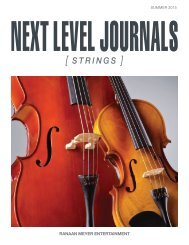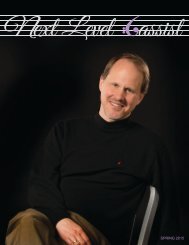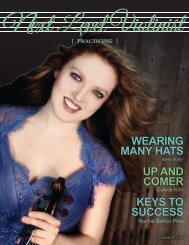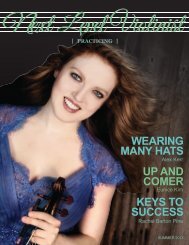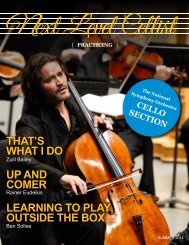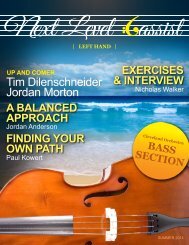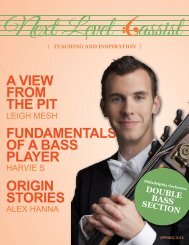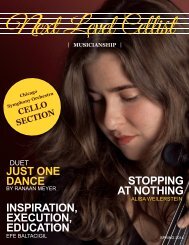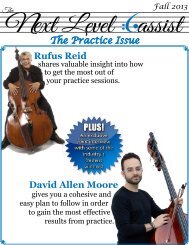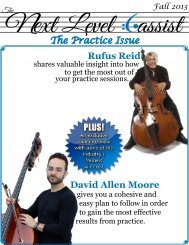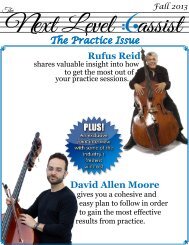Next Level Bassist Musicality Issue
Articles by Sarah Hogan and John Patitucci, Spotlight on the Pittsburgh Symphony, Double Stop Strum by Ranaan Meyer
Articles by Sarah Hogan and John Patitucci, Spotlight on the Pittsburgh Symphony, Double Stop Strum by Ranaan Meyer
You also want an ePaper? Increase the reach of your titles
YUMPU automatically turns print PDFs into web optimized ePapers that Google loves.
the San Francisco Opera, and he had incredible insights into singing.<br />
I remember playing Marcello sonatas and the first Bach Cello Suite for<br />
him, and he would make me sing to find the music. I’m Italian, I’m a<br />
tenor and I was lucky to be born with some innate ability for this but<br />
this aspect of phrasing is so important.<br />
Identify some records that can be a well of inspiration or joy. I think<br />
a lot of musicians have “go to” recordings that they return to when<br />
they’re dry. If you’re a young player, you should be building that list!<br />
Everybody learns differently, but I’ve had a lot of success getting<br />
people excited about the feeling of music by practicing drums with a<br />
record. I recommend a really swinging record like “Taking Off,” Herbie<br />
Hancock’s first solo record, with Billy Higgins playing. (Check out<br />
Driftin’ here) Find a slow enough tempo that you can play along with<br />
the ride cymbal, and that drummer can make you feel like a million<br />
bucks. If you’re not smiling in about 8 bars, maybe you really need<br />
to dig deeper.<br />
Music is a tricky subject and not everyone responds the same way. I’ve<br />
had instances where the main job I thought I had teaching or collaborating<br />
with people was helping them let go of that incredibly tight grip<br />
they had on their emotions. Sometimes we’re so afraid of making a<br />
mistake that we can’t let go and feel the music. At the end of the day, if<br />
you aren’t doing all the things you’re doing to create an image or tell a<br />
story, you’re missing the mark.<br />
I always draw a distinction between a “correct” performance and one<br />
that is deep and meaningful. I’m totally okay with encouraging a student<br />
to make a mistake and take some chances, because great music is<br />
always being made on the edge! If we play a wrong note, or don’t play<br />
everything the way we want to play it, the problem is we judge our<br />
whole existence on that performance. We feel so crushed or destroyed<br />
for making a mistake…it’s only music, man! Music is deep, important,<br />
emotional, and it makes us feel things, but it’s not the way you measure<br />
yourself in this life. If you do that, you’re setting up music as a very<br />
harsh master, and it becomes an idol. If you do that (and I know, because<br />
I’m sometimes a victim of a perfectionistic streak), you’ll simply<br />
never be satisfied.<br />
Presentation<br />
With all the work of creating a beautiful sound, an unstoppable<br />
groove, and all the meaningful storytelling in the world, some people<br />
stumble at the finish line because of nerves and uncertainty. The most<br />
important lesson you can learn if you’re trying to break into music at<br />
a higher level is that nerves don’t disappear with experience. Although<br />
my level of anxiety is different as a soloist in front of an orchestra than<br />
it is playing next to Wayne Shorter, I still have my concerns and you<br />
will too.<br />
I know when I approach a certain type of music, like a Bottesini show<br />
piece, that I’m going to need a period of practicing to get it ready.<br />
Prior to recording a duet with Jeremy McCoy, I practiced the piece for<br />
a whole year! You may find you need the same time to feel comfortable,<br />
or you might find that you just need to walk out on stage and play<br />
something a few times before you can find peace with it. I can say that<br />
I’ve always poured myself 100% into the work I was given, whether<br />
that was my classical studies in college, or my time with Chick Corea,<br />
or the last 13 years in Wayne Shorter’s band. Even with my best and<br />
most focused work, I’ve found that I still have a big place in my heart<br />
for prayer and meditation. It’s not the same as working on scales, but I<br />
know what will settle me and help me find my feet.<br />
Most of the playing we will do in our lives will be in groups with other<br />
people. There’s something absolutely magical to us and to audiences<br />
about the trust and the community of playing in an ensemble. It<br />
makes it easy to play with others and not be nervous, because we build<br />
that muscle our entire careers. Playing alone, playing a solo, or being<br />
featured is another muscle you need to develop conscientiously, just<br />
like you would intonation or tone. Find out whether you need to settle<br />
yourself into the sweet spot, or if you need to kindle a fire to be at your<br />
best, and learn how to do it for yourself.<br />
Conclusions<br />
Everything I’ve said here constitutes a long list of things to learn. You<br />
have to be willing to struggle and learn new things as long as you play<br />
bass. As an adult, I studied for 2 years with Johnny Schaffer from the<br />
New York Philharmonic. I had to go in there and be willing to say<br />
“show me everything, show me the way you do it” and I learned so<br />
much. In fact, I’m stilling learning so much. It never ends!<br />
For my entire life, I’ve been insatiable in my desire to learn more music,<br />
and to learn more about myself. Once you find that same desire,<br />
you will have no trouble improving all the time. Lean on the resources<br />
available to you, seek out new ones, and connect with your fellow<br />
musicians to grow and to help them too. Being a great person is part of<br />
being a great musician.<br />
Finally, get out into the world and try new things. Stay positive when<br />
it feels like you aren’t playing up to your full potential. You have to remind<br />
yourself that it’s sometimes a few bars in a whole night of music<br />
and you can’t go to a dark place over that. Don’t base your self-worth<br />
over the solo in one tune? The world’s not going to stop! Don’t put the<br />
whole weight of the world on the music you’re playing, because the<br />
only way to guarantee nothing magical happens is if you don’t<br />
take chances. ■<br />
There’s no right or wrong way to deal with performing, it’s simply your<br />
job to figure out what will work best for you in a given situation. Learn<br />
what kind of preparation time you need for a recital, or for a gig, and<br />
stick to it. At the end of the journey, you’ll be where you are because<br />
of the work you put it, and it’s ok to appreciate that. Any performance<br />
is just a snapshot of you at that moment, with all the time and effort<br />
you’ve put in.<br />
NOV/DEC 2013 NEXT LEVEL BASSIST 17




